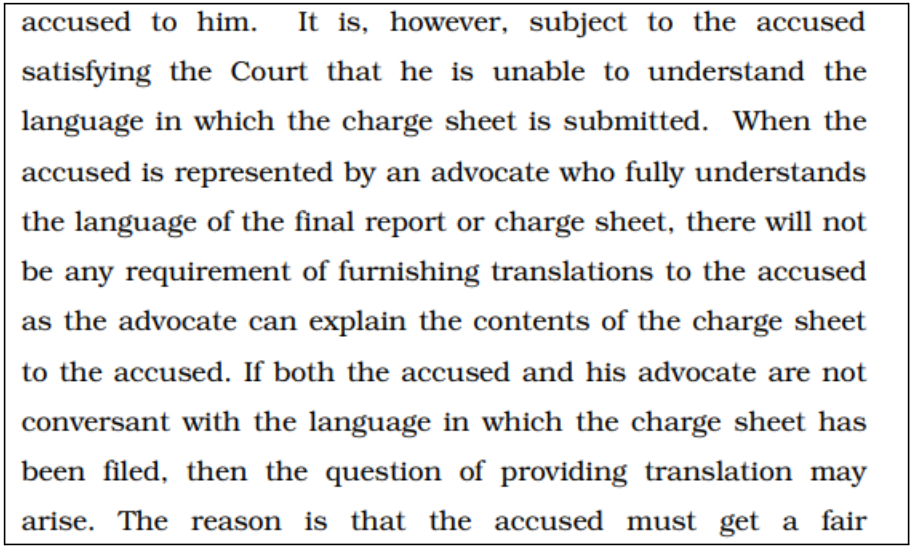In this week’s review of Court Judgments, we look at the Supreme Court’s judgment that presumption of innocence is a human right, that once an appointment has been declared illegal, continuing in service becomes untenable, that when employer’s question is vague, they can’t deny appointment stating suppression of facts, and Kerala HC’s judgment which said that the term ‘relative’ confers a status which can only be achieved by blood, marriage or adoption.
Kerala HC: The term ‘relative’ confers a status which can only be achieved by blood, marriage or adoption
In Chandhini T K vs. State of Kerala, the complainant and the primary defendant were married under Hindu Law in 2009. Their marriage turned difficult, and she filed a complaint against her husband and other accused, accusing them of cruelty as per section 498A of the IPC (Indian Penal Code). She claimed that they committed the offense described in section 498A along with section 34 of IPC, which pertains to the common intention to commit a criminal act. Section 498A, IPC defines and provides punishment for cruelty committed by the husband or relative of the husband of a woman.
The petitioner approached the High Court to quash the criminal proceedings against her stating that the complaint against the petitioner was not maintainable under Section 498A, IPC as she was not a relative of the husband who was the first accused. She was the complainant’s husband’s live-in partner. The Kerala High Court Bench of Justice K Babu held that the term ‘relative’ appearing in Section 498A of IPC would not include the husband’s girlfriend or a woman with whom a man has a sexual relationship outside of marriage. It also noted that the term relative confers a status that can only be achieved by blood, marriage, or adoption. The Bench quashed the criminal proceedings against the petitioner.
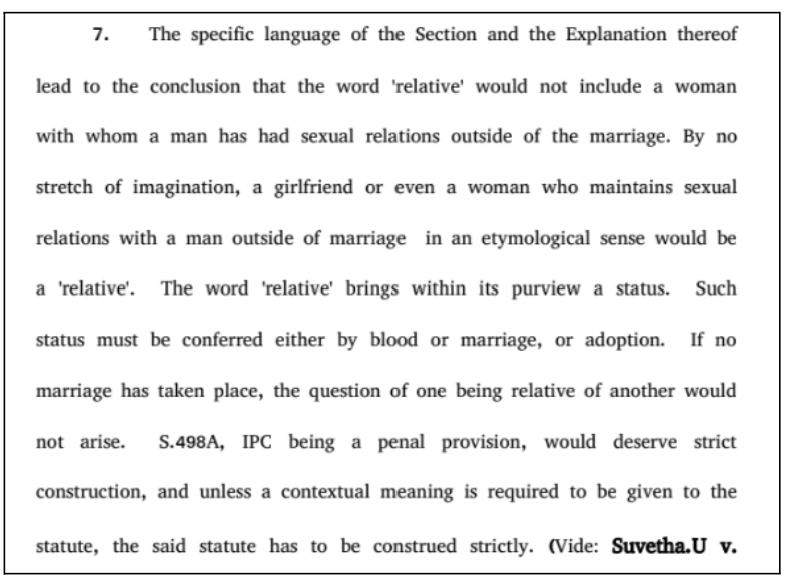
SC: Presumption of innocence is a human right
In Suresh Thipmppa Shetty vs. State of Maharashtra, the appellant and Sadashiv Seena Salian were convicted by the Trial Court in a murder case. They were charged with entering criminal conspiracy in 1994-1995 to kidnap and murder a person. The Bombay High Court dismissed their appeals. They appealed to the Supreme Court.
The Supreme Court bench, comprising of Justices Vikram Nath and Ahsanuddin Amanullah observed that that the main people thought to be involved in the plot, as described by the prosecution, were found not guilty. With respect to the plans that didn’t include these key individuals, it was stated by the Court that they couldn’t establish certainty about it considering the evidence at hand. Furthermore, it noted that the appellants were not present at the scene of the crime, nor directly involved in its execution, and so their convictions could not stand.
It added that the presumption of innocence in favour of the accused and insistence on the prosecution to prove its case beyond a reasonable doubt are not empty formalities. That is, the Court stated that these principles were more than mere formalities and emphasized that life and liberty are not subjects to be treated lightly. However, the Court, while recognizing that certain offenses impose a reverse onus on the accused to prove innocence, it reiterated that this does not detract from the overarching principle of “innocent until proven guilty” for other criminal offenses. The Court reversed the convictions in the case, emphasizing that the fundamental right of being presumed innocent cannot be weakened. The Supreme Court acquitted the individuals.
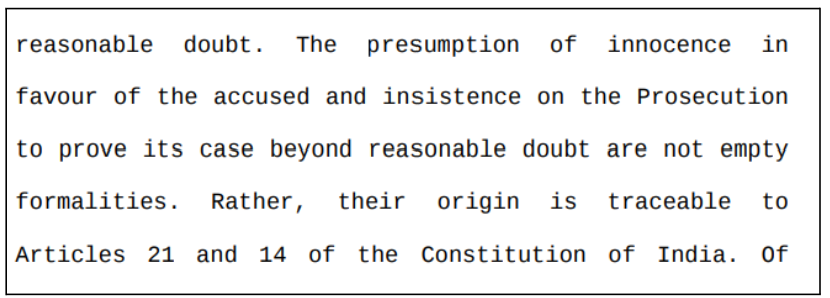
SC: Once an appointment has been declared illegal, continuing in service becomes untenable
In Dulu Deka vs. State of Assam, the Supreme Court heard an appeal against a judgment of the Gauhati High Court which dismissed the claim of the appellant for release of unpaid salary from 2001 for working as an Assistant teacher in Assam. As per her claim, she stated that she was appointed as an Assistant Teacher at Bengabari M.E. School, under the purported vacancies in Udalguri Legislative Assembly Constituency. As per the terms of the order, her contract ended in 2002.
The Supreme Court bench comprising Justices Hima Kohli and Justice Rajesh Bindal noted that she had worked without salary for two decades. The Bench stated that even otherwise, it is difficult to believe that a person has been working for two decades without any salary. Even the writ petition filed by her in the High Court in the year 2008, claiming salary from 12 March 2001 onwards was seven years later. The Supreme Court held that once the appointment has been declared illegal and void ab initio by the Director of Elementary Education in Assam in 2001, continuing in service becomes untenable in the absence of a challenge to the cancellation order. Stating this, the bench upheld the High Court’s order.
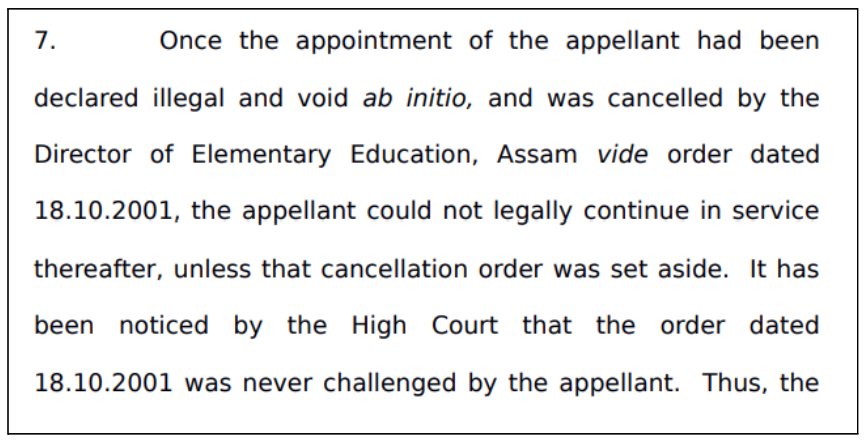
SC: When employer’s question is vague, they can’t deny appointment stating suppression of facts
The case State of West Bengal vs. Mitul Kumar Jana involved the selection of a candidate for the post of constable in the West Bengal Police Force. There were allegations against the appellant that he had not disclosed information related to a criminal offence during the application process where the candidates fill in details about their criminal history.
The Supreme Court Bench comprising Justices J. K. Maheshwari, and K.V. Vishwanathan observed that the police constable was not legally bound to furnish information about pending criminal cases, as the query was specific about arrest, detention, and conviction. Whatever he was supposed to declare, he had declared, noted the Court. Referring to past judgements in a similar matter, the Court held that the information sought in the verification roll was not specific and vague in nature while the respondent has specifically disclosed the information which was required to be furnished. Taking into account the subsequent development of the clean acquittal of respondent for the petty offences, it requires objective evaluation by the authority, about the question of fitness, without giving weight to the issue of suppression of information. In short, the Court held that appointment can’t be denied citing suppression of facts when the query of the employer itself was vague.
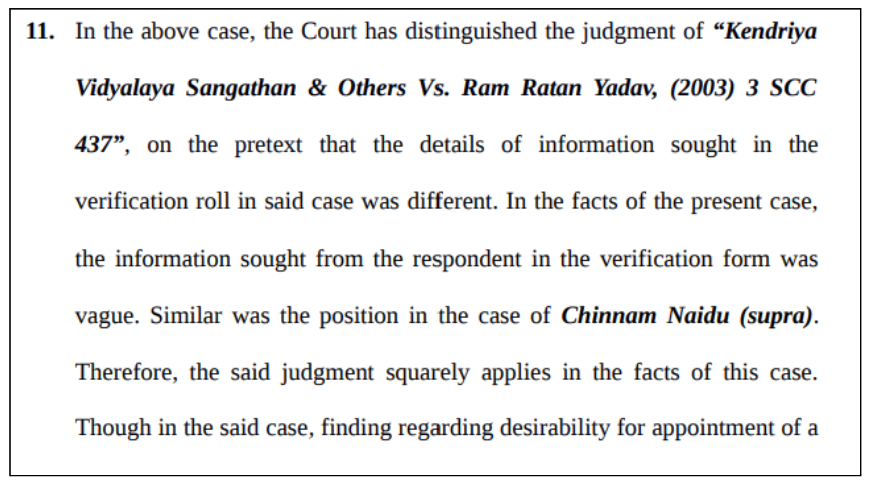
SC: If both the accused and advocate don’t know the language in which the chargesheet is filed, the Courts can direct prosecution to provide a translated version of the document
In the case CBI vs. Narottam Dhakad, the Supreme Court was dealing with 2 chargesheets filed by CBI with respect to the offences arising out of the VYAPAM Scam in Madhya Pradesh. In the contention filed by an appellant that he did not understand the charge sheet filed in English, the Judicial Magistrate held that he ought to know English as he was an educated person. When the matter was referred to the High Court, it held that Hindi was the only language of the Criminal Courts in the state and that the first respondent was entitled to get a translation of the charge sheet in the language of the Court.
The Supreme Court Bench of Justices Abhay S Oka and Rajesh Bindal observed that if both the accused and his advocate are not conversant with the language in which the charge sheet has been filed, the Courts can always tell the prosecution to give a translated version of the charge sheet. Further, it added that there was no specific provision in CrPC that requires the investigating agency/officer to file it in the language of the Court determined in accordance with Section 272 of CrPC.
